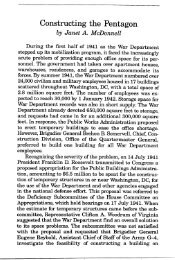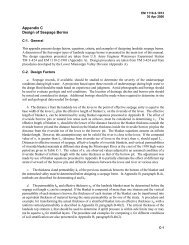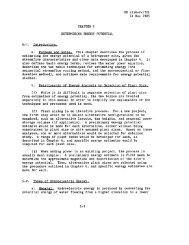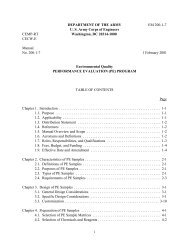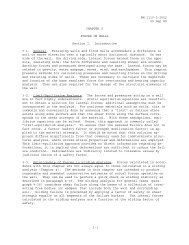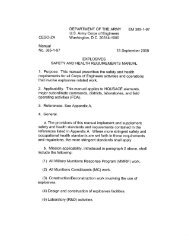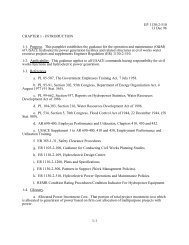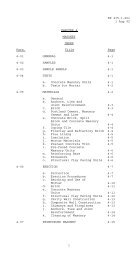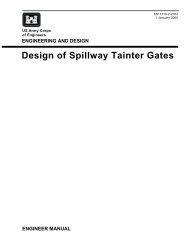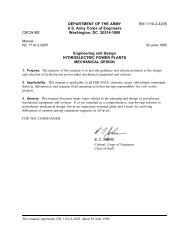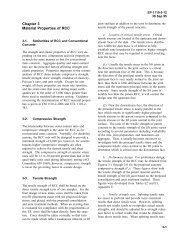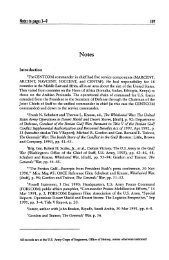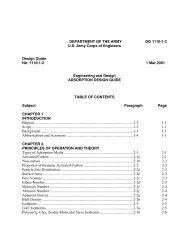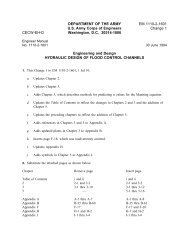41st Engineer Regiment - Publications, US Army Corps of Engineers
41st Engineer Regiment - Publications, US Army Corps of Engineers
41st Engineer Regiment - Publications, US Army Corps of Engineers
You also want an ePaper? Increase the reach of your titles
YUMPU automatically turns print PDFs into web optimized ePapers that Google loves.
<strong>41st</strong> <strong>Engineer</strong> <strong>Regiment</strong><br />
Q . What was your first assignment after you graduated from West Point?<br />
Edward L. Rowny<br />
A . . My first assignment was a very fascinating one in the <strong>41st</strong> Combat <strong>Engineer</strong>s under<br />
"Smokey Joe” Wood, a colonel who became a general <strong>of</strong>ficer during the war. He<br />
was a very imaginative and colorful individual. Although not a graduate, he was<br />
a great booster <strong>of</strong> West Point. The unit was the famous <strong>41st</strong> ‘Singing <strong>Engineer</strong>s,”<br />
stationed at Fort Bragg, North Carolina, a Negro unit.<br />
Wood was absolutely convinced the U.S. would soon be in a war and trained us<br />
very hard. He was the butt <strong>of</strong> many jokes; many <strong>of</strong> his fellow <strong>of</strong>ficers thought he<br />
was simply apple poiishing and trying to get ahead <strong>of</strong> his contemporaries. Wood<br />
not only believed war was imminent but that it would start with an attack by Japan.<br />
He was imaginative to the point <strong>of</strong> being thought eccentric. He constantly avoided<br />
routine engineering tasks and during maneuvers employed us like a cavalry unit.<br />
He loved playing General Sheridan.<br />
We were around a campfire during a maneuver in South Carolina, on December<br />
7, 1941, when we learned about the attack on Pearl Harbor. Everyone was stunned<br />
except Wood who could have said, but didn’t say, "I told you so." What he did<br />
say was, "You men haven’t seen anything yet. Now that we’re in a war I’m going<br />
to act like I’ve gone berserk. That’s the way to rise to the top in time <strong>of</strong> war.”<br />
Wood’s eccentricities were many-too many to go into. For one thing, he wouldn’t<br />
have any married <strong>of</strong>ficers in his unit. He wanted each to be, like himself, a<br />
bachelor. "I want <strong>of</strong>ficers to be celibates, dedicated like Catholic priests to a<br />
single cause, unencumbered with the responsibility <strong>of</strong> a family.” He <strong>of</strong>ten quoted<br />
the old saw: “If the <strong>Army</strong> wanted you to have a wife they would have issued you<br />
one. *<br />
Most <strong>of</strong> Wood’s ideas, though far out, were conceived to further the <strong>Army</strong>’s<br />
missions. For example, Wood hated the idea <strong>of</strong> “fatigue details? Soldiers should<br />
“train, train, train,* he would say. "Things like peeling potatoes, cooking,<br />
washing dishes, picking up trash, and other menial tasks should be left to<br />
handicapped civilians who can’t fight. Soldiers should train and fight.”<br />
Wood considered himself the best trainer in the <strong>Army</strong>. After the war broke out,<br />
new units began to be formed for which we had to provide cadres, a new cadre<br />
every month. Wood’s concept was to give up his best men-“We owe it to the<br />
new units,” he said, "to start them <strong>of</strong>f right. Besides, who can train new recruits<br />
better than we?"<br />
7
<strong>Engineer</strong> Memoirs<br />
The net result <strong>of</strong> giving up our best men each month not only meant giving up our<br />
best men, but resulted in our being left with the worst ones. One Saturday<br />
morning, at an <strong>of</strong>ficer’s call session with his 2 battalion and 12 company<br />
commanders, the commanders complained bitterly that they were being forced to<br />
command the dregs <strong>of</strong> the <strong>Army</strong>.<br />
"All the best men you sent <strong>of</strong>f,” they said, “and we’re left with the stupid, inept,<br />
lame, and blind. All we’re left with are misfits. The worst 10 percent <strong>of</strong> our units<br />
take up 90 percent <strong>of</strong> our time."<br />
"Can you identify the misfits?” Wood asked. “Write down the names <strong>of</strong> ten<br />
soldiers you hope never to see again.” When they had done so Wood told me to<br />
pick up the lists <strong>of</strong> names. I collected them and started to put them in front <strong>of</strong><br />
Colonel Wood, but he didn’t accept them. Instead, he put them on the table in<br />
front <strong>of</strong> me.<br />
"Lieutenant Rowny, w he said, "I appoint you commander <strong>of</strong> 'J' Company, our new<br />
special training unit. These are your men.” J Company doesn’t exist in the <strong>Army</strong>.<br />
It was stricken from the rosters after a mutiny had occurred in a J Company during<br />
the Civil War.<br />
I protested that I had no staff, no one to help me train the men. "For those,” he<br />
said, "you can pick a man from each <strong>of</strong> the companies. Pick any man you want.”<br />
Naturally, I picked the best.<br />
This time the commanders complained. "It's only fair,” Wood said, “that if you<br />
lose 10 misfits you have to give up one <strong>of</strong> your best. Transfer the men this<br />
afternoon,” he said, “to J Company. I’ll be around to inspect J Company Monday<br />
morning. n<br />
It was a challenge I never expected to have to meet. The men assigned me had low<br />
IQ’s, they were slow, and many <strong>of</strong> them had physical disabilities.<br />
But told repeatedly that they were the "<strong>41st</strong>'s Finest," and drilled eight hours a day<br />
by the best noncommissioned <strong>of</strong>ficers <strong>of</strong> the regiment, they turned into the unit’s<br />
elite company. Three months later, <strong>of</strong> 12 monthly competitions for best soldier,<br />
best driver, and the like, J Company captured 10 first places, 1 second place, and<br />
1 third place. A month later, J Company was disbanded and the men sent back to<br />
their original companies. Wood had proved his point. "There are no good units<br />
and no poor units; only good commanders and poor commanders.”<br />
We were the first unit to go overseas in World War II, mostly because Wood told<br />
Washington we were ready. We weren’t; but because Wood had trained us hard
Edward L. Rowny<br />
we were readier than any other unit. We were sent to Liberia in early 1942 to<br />
construct an airfield and be a possible base <strong>of</strong> operations for combat in North<br />
Africa.<br />
The day after we sailed from Charleston for our 10-day trip to Liberia, Colonel<br />
Wood opened up his secret instructions. They were in the form <strong>of</strong> a 20-page letter<br />
<strong>of</strong> instructions and five volumes <strong>of</strong> detailed plans. Colonel Wood assembled the<br />
<strong>of</strong>ficers in his cabin and read aloud the letter <strong>of</strong> instructions. He then asked me-1<br />
was then the operations <strong>of</strong>ficer-to open the porthole. I thought it was to let in<br />
some fresh air. To the astonishment <strong>of</strong> all <strong>of</strong> us, Wood got up on a chair and<br />
tossed the five volumes out to sea.<br />
“These damned bureaucrats in Washington don’t know how to assign mission-type<br />
orders,” he said. "The letter <strong>of</strong> instructions is all we need." And at that he<br />
instructed us to draw up detailed plans to carry out the instructions.<br />
To this day, I don’t know whether the detailed plans we threw away were any<br />
good. But it gave us something to do for the next nine days at sea, and we had no<br />
one to blame but ourselves for how the instructions werecarried out. In retrospect,<br />
I think we did pretty well. The planning exercise forced us to think through what<br />
needed to be done.<br />
Later in 1942, Colonel Wood was promoted to brigadier general. He returned to<br />
the U.S. to establish the cadre for the 92d Division. He had me come back to<br />
work for him. General Wood had a lot to do with initiating basic reforms in the<br />
<strong>Army</strong>. He was ahead <strong>of</strong> the times in developing concepts to promote military<br />
efficiency.<br />
92d Infantry Division, Fort Huachuca<br />
Q .<br />
A . .<br />
Where was the cadre for the 92d Division located?<br />
The division cadre was divided among four locations. The headquarters and<br />
division artillery were at Fort Bragg, North Carolina. Each <strong>of</strong> the three regiments<br />
was located in a different state, one at Camp Breckenridge, Kentucky, a second in<br />
Anniston, Alabama, and the third in Fort Donaldson, Tennessee. The <strong>Army</strong> was<br />
afraid to put more than one regiment in any one state in the South. In 1943 we<br />
assembled the entire division at Fort Huachuca, Arizona, replacing the 93d<br />
Division which had been sent to the Pacific Theater.



